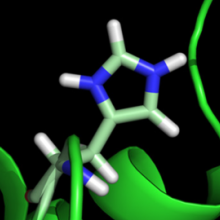The treatment of pH sensitive ionization states for titratable residues in proteins is often omitted from molecular dynamics (MD) simulations. While static charge models can answer many questions regarding protein conformational equilibrium and protein–ligand interactions, pH-sensitive phenomena such as acid-activated chaperones and amyloidogenic protein aggregation are inaccessible to such models. Constant pH molecular dynamics (CPHMD) coupled with the Generalized Born with a Simple sWitching function (GBSW) implicit solvent model provide an accurate framework for simulating pH sensitive processes in biological systems. Although this combination has demonstrated success in predicting pKa values of protein structures, and in exploring dynamics of ionizable side-chains, its speed has been an impediment to routine application. The recent availability of low-cost graphics processing unit (GPU) chipsets with thousands of processing cores, together with the implementation of the accurate GBSW implicit solvent model on those chipsets (Arthur and Brooks, J. Comput. Chem. 2016, 37, 927), provide an opportunity to improve the speed of CPHMD and ionization modeling greatly. Here, we present a first implementation of GPU-enabled CPHMD within the CHARMM-OpenMM simulation package interface. Depending on the system size and nonbonded force cutoff parameters, we find speed increases of between one and three orders of magnitude. Additionally, the algorithm scales better with system size than the CPU-based algorithm, thus allowing for larger systems to be modeled in a cost effective manner. We anticipate that the improved performance of this methodology will open the door for broad-spread application of CPHMD in its modeling pH-mediated biological processes.
